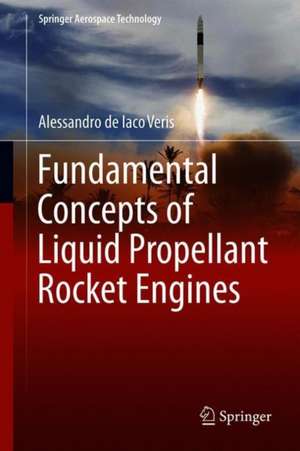Fundamental Concepts of Liquid-Propellant Rocket Engines: Springer Aerospace Technology
Autor Alessandro de Iaco Verisen Limba Engleză Hardback – 27 sep 2020
| Toate formatele și edițiile | Preț | Express |
|---|---|---|
| Paperback (1) | 452.22 lei 6-8 săpt. | |
| Springer International Publishing – 28 sep 2021 | 452.22 lei 6-8 săpt. | |
| Hardback (1) | 455.78 lei 6-8 săpt. | |
| Springer International Publishing – 27 sep 2020 | 455.78 lei 6-8 săpt. |
Din seria Springer Aerospace Technology
- 20%
 Preț: 629.52 lei
Preț: 629.52 lei - 18%
 Preț: 944.19 lei
Preț: 944.19 lei - 18%
 Preț: 1112.30 lei
Preț: 1112.30 lei - 18%
 Preț: 779.26 lei
Preț: 779.26 lei - 17%
 Preț: 489.87 lei
Preț: 489.87 lei - 18%
 Preț: 949.73 lei
Preț: 949.73 lei - 18%
 Preț: 891.33 lei
Preț: 891.33 lei - 18%
 Preț: 897.65 lei
Preț: 897.65 lei -
 Preț: 366.33 lei
Preț: 366.33 lei - 18%
 Preț: 782.42 lei
Preț: 782.42 lei - 24%
 Preț: 1176.27 lei
Preț: 1176.27 lei - 24%
 Preț: 855.08 lei
Preț: 855.08 lei - 15%
 Preț: 583.78 lei
Preț: 583.78 lei - 15%
 Preț: 579.84 lei
Preț: 579.84 lei - 18%
 Preț: 1112.60 lei
Preț: 1112.60 lei - 18%
 Preț: 947.35 lei
Preț: 947.35 lei - 23%
 Preț: 1611.32 lei
Preț: 1611.32 lei - 15%
 Preț: 581.98 lei
Preț: 581.98 lei - 18%
 Preț: 1112.15 lei
Preț: 1112.15 lei - 15%
 Preț: 578.87 lei
Preț: 578.87 lei - 18%
 Preț: 995.83 lei
Preț: 995.83 lei - 15%
 Preț: 635.01 lei
Preț: 635.01 lei - 18%
 Preț: 1406.03 lei
Preț: 1406.03 lei - 24%
 Preț: 1798.67 lei
Preț: 1798.67 lei - 15%
 Preț: 580.68 lei
Preț: 580.68 lei - 15%
 Preț: 701.25 lei
Preț: 701.25 lei - 18%
 Preț: 896.21 lei
Preț: 896.21 lei - 15%
 Preț: 646.30 lei
Preț: 646.30 lei - 18%
 Preț: 943.88 lei
Preț: 943.88 lei - 15%
 Preț: 576.42 lei
Preț: 576.42 lei - 15%
 Preț: 703.20 lei
Preț: 703.20 lei - 18%
 Preț: 992.49 lei
Preț: 992.49 lei - 18%
 Preț: 947.35 lei
Preț: 947.35 lei - 18%
 Preț: 784.79 lei
Preț: 784.79 lei
Preț: 455.78 lei
Nou
Puncte Express: 684
Preț estimativ în valută:
87.26€ • 91.04$ • 73.14£
87.26€ • 91.04$ • 73.14£
Carte tipărită la comandă
Livrare economică 13-27 martie
Preluare comenzi: 021 569.72.76
Specificații
ISBN-13: 9783030547035
ISBN-10: 3030547035
Pagini: 747
Ilustrații: IX, 747 p. 456 illus., 57 illus. in color.
Dimensiuni: 155 x 235 x 50 mm
Greutate: 1.23 kg
Ediția:1st ed. 2021
Editura: Springer International Publishing
Colecția Springer
Seria Springer Aerospace Technology
Locul publicării:Cham, Switzerland
ISBN-10: 3030547035
Pagini: 747
Ilustrații: IX, 747 p. 456 illus., 57 illus. in color.
Dimensiuni: 155 x 235 x 50 mm
Greutate: 1.23 kg
Ediția:1st ed. 2021
Editura: Springer International Publishing
Colecția Springer
Seria Springer Aerospace Technology
Locul publicării:Cham, Switzerland
Cuprins
Preface.- Chapter 1: Fundamental concepts on liquid-propellant rocket Engines.- Chapter 2: The thrust chamber assembly.- Chapter 3: Feed systems using gases under pressure.- Chapter 4: Feed systems using turbo-pumps.- Chapter 5: Control systems and valves.- Chapter 6: Tanks for propellants.- Chapter 7: Interconnecting components and structures.
Notă biografică
Alessandro de Iaco Veris holds degrees in civil engineering and aerospace engineering, both from the University of Rome. He has also completed specialist training, including a high-level professional course on “Projet, calcul et emploi des fusées spatiales” at the Ecole Nationale Supérieure de l'Aéronautique et de l'Espace (ENSAE) and a course on “Dynamics of Controlled Structures” at Massachusetts Institute of Technology (MIT). He is a strong proponent of the application of mathematics for practical purposes and in particular for the solution of problems arising in engineering. His expertise is in the fields of mathematical models and numerical methods for aerodynamics, space flight mechanics, system studies, and mission analysis. His professional interests include numerical integration methods used to predict the motion of space vehicles and Earth satellites subject to perturbations.
Textul de pe ultima copertă
This book is intended for students and engineers who design and develop liquid-propellant rocket engines, offering them a guide to the theory and practice alike. It first presents the fundamental concepts (the generation of thrust, the gas flow through the combustion chamber and the nozzle, the liquid propellants used, and the combustion process) and then qualitatively and quantitatively describes the principal components involved (the combustion chamber, nozzle, feed systems, control systems, valves, propellant tanks, and interconnecting elements). The book includes extensive data on existing engines, typical values for design parameters, and worked-out examples of how the concepts discussed can be applied, helping readers integrate them in their own work. Detailed bibliographical references (including books, articles, and items from the “gray literature”) are provided at the end of each chapter, together with information on valuable resources that can be found online. Given its scope, the book will be of particular interest to undergraduate and graduate students of aerospace engineering.
Caracteristici
Includes extensive data on current engines and worked-out examples with their numerical results Intended for aerospace engineers, particularly those who design liquid-propellant engines Uses only the metric system (SI) Written in a highly readable style
